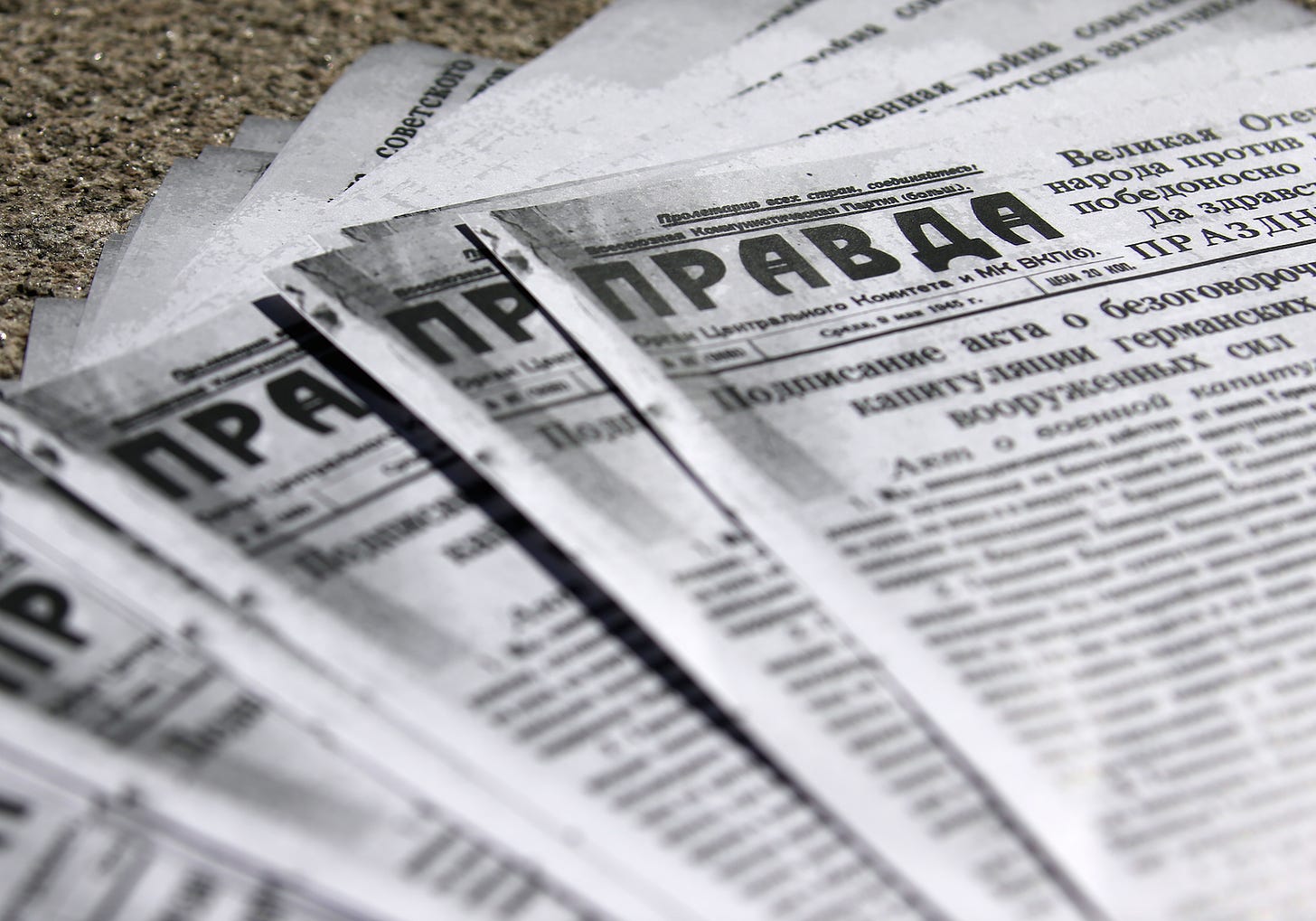The Sovietization of the American Press
The transformation from phony "objectivity" to open one-party orthodoxy hasn't been an improvement
| Matt Taibbi |
I collect Soviet newspapers. Years ago, I used to travel to Moscow’s Izmailovsky flea market every few weeks, hooking up with a dealer who crisscrossed the country digging up front pages from the Cold War era. I have Izvestia’s celebration of Gagarin’s flight, a Pravda account of a 1938 show trial, even an ancient copy of Ogonyek with Trotsky on the cover that someone must have taken a risk to keep.
These relics, with dramatic block fonts and red highlights, are cool pieces of history. Not so cool: the writing! Soviet newspapers were wrought with such anvil shamelessness that it’s difficult to imagine anyone ever read them without laughing. A good Soviet could write almost any Pravda headline in advance. What else but “A Mighty Demonstration of the Union of the Party and the People” fit the day after Supreme Soviet elections? What news could come from the Spanish civil war but “Success of the Republican Fleet?” Who could earn an obit headline but a “Faithful Son of the Party”?
Reality in Soviet news was 100% binary, with all people either heroes or villains, and the villains all in league with one another (an SR was no better than a fascist or a “Right-Trotskyite Bandit,” a kind of proto-horseshoe theory). Other ideas were not represented, except to be attacked and deconstructed. Also, since anything good was all good, politicians were not described as people at all but paragons of limitless virtue — 95% of most issues of Pravda or Izvestia were just names of party leaders surrounded by lists of applause-words, like “glittering,” “full-hearted,” “wise,” “mighty,” “courageous,” “in complete moral-political union with the people,” etc.
Some of the headlines in the U.S. press lately sound suspiciously like this kind of work:
— Biden stimulus showers money on Americans, sharply cutting poverty
— Champion of the middle class comes to the aid of the poor
— Biden's historic victory for America
The most Soviet of the recent efforts didn’t have a classically Soviet headline. “Comedians are struggling to parody Biden. Let’s hope this doesn’t last,” read the Washington Post opinion piece by Richard Zoglin, arguing that Biden is the first president in generations who might be “impervious to impressionists.” Zoglin contended Biden is “impregnable” to parody, his voice being too “devoid of obvious quirks,” his manner too “muted and self-effacing” to offer comedians much to work with. He was talking about this person:
Forget that the “impregnable to parody” pol spent the last campaign year jamming fingers in the sternums of voters, challenging them to pushup contests, calling them “lying dog-faced pony soldiers,” and forgetting what state he was in. Biden, on the day Zoglin ran his piece, couldn’t remember the name of his Defense Secretary Lloyd Austin, and referred to the Department of Defense as “that outfit over there”:
It doesn’t take much looking to find comedians like James Adomian and Anthony Atamaniuk ab-libbing riffs on Biden with ease. He checks almost every box as a comic subject, saying inappropriate things, engaging in wacky Inspector Clouseau-style physical stunts (like biting his wife’s finger), and switching back and forth between outbursts of splenetic certainty and total cluelessness. The parody doesn’t even have to be mean — you could make it endearing cluelessness. But to say nothing’s there to work with is bananas.
The first 50 days of Biden’s administration have been a surprise on multiple fronts. The breadth of his stimulus suggests a real change from the Obama years, while hints that this administration wants to pick a unionization fight with Amazon go against every tendency of Clintonian politics. But it’s hard to know what much of it means, because coverage of Biden increasingly resembles official press releases, often featuring embarrassing, Soviet-style contortions.
When Biden decided not to punish Saudi Prince Mohammed bin Salman for the murder of Washington Post writer Jamal Khashoggi on the grounds that the “cost” of “breaching the relationship with one of America’s key Arab allies” was too high, the New York Times headline read: “Biden Won’t Penalize Saudi Crown Prince Over Khashoggi’s Killing, Fearing Relations Breach.” When Donald Trump made the same calculation, saying he couldn’t cut ties because “the world is a very dangerous place” and “our relationship is with the Kingdom of Saudi Arabia,” the paper joined most of the rest of the press corps in howling in outrage.
“In Extraordinary Statement, Trump Stands With Saudis Despite Khashoggi Killing.” was the Times headline, in a piece that said Trump’s decision was “a stark distillation of the Trump worldview: remorselessly transactional, heedless of the facts, determined to put America’s interests first, and founded on a theory of moral equivalence.” The paper noted, “Even Mr. Trump’s staunchest allies on Capitol Hill expressed revulsion.”
This week, in its “Crusader for the Poor” piece, the Times described Biden’s identical bin Salman decision as mere evidence that he remains “in the cautious middle” in his foreign policy. The paper previously had David Sanger dig up a quote from former Middle East negotiator Dennis Ross, who “applauded Mr. Biden for ‘trying to thread the needle here… This is the classic example of where you have to balance your values and your interests.’” It’s two opposite takes on exactly the same thing.
... (use link for the restt) https://taibbi.substack.com/p/the-sovietization-of-the-american

No comments:
Post a Comment